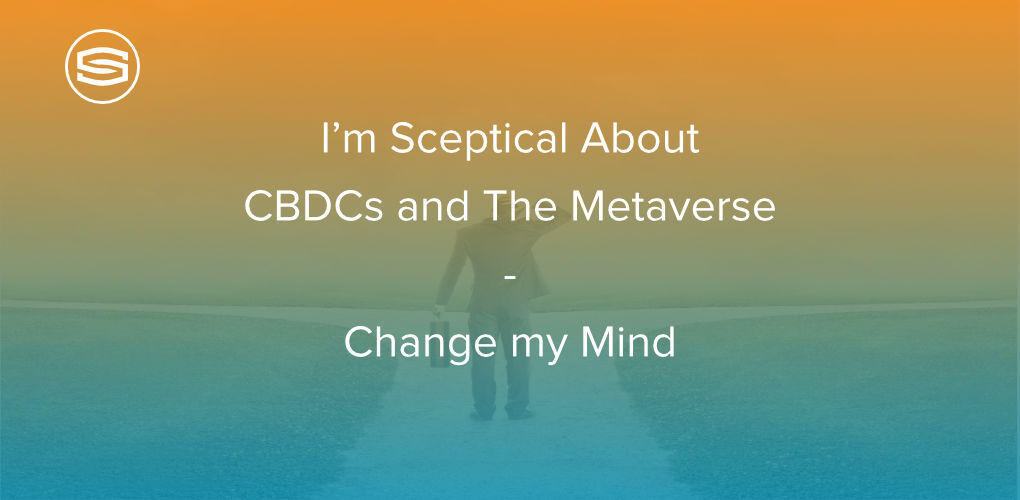
Insights & Opinions
I’m Sceptical About CBDCs and The Metaverse - Change my Mind
Tue, 19 Sep 2023


I recently heard an ex-colleague of mine describe himself as a “Professional Sceptic”, which I may consider putting on my own business cards in the future.
It’s easy to get caught up in headlines and hype and I find that maintaining a healthy level of scepticism helps me to reach a balanced opinion on any topic.
In fact, I’ll play the role of “professional sceptic” even when I hold the same views as the person I’m listening to, as I find the conversation that follows far more interesting as a result.
And so, I approached the topics covered at The Banking Scene BBQ last week as a Professional Sceptic.
First up was a panel moderated by Dave Birch on the “Building Blocks for a Successful Future-Proof Construct of Money”. He opened the session by asking the audience to name a few sci-fi currencies to stretch our thinking beyond current constructs.
I brought up the “Galactic Credits” system used in Star Wars although I incorrectly said “Star Trek” at first - much to the disgust of all serious fans of both genres! Dave was quick to dismiss this as a concept, pointing out that it would be impossible to set interest rates on a per country basis for a single currency. I’m unconvinced by this argument as it seems to be easy enough for banks to set different interest rates for individuals today, so why should it be so quickly ruled out as a concept in the future? Furthermore, the announcement by the Digital Currency Monetary Authority (DCMA) at the IMF spring meeting earlier this year looks suspiciously like a Global Galactic Currency to me!
However, due to my Star Wars / Star Trek faux pas, there was a brief discussion regarding the fact that Star Trek does not have any concept of money, as anything that is needed can simply be produced by a “replicator” in a post-scarcity universe. This raised the possibility that we might not even need money at all in the future.
Someone from the audience mentioned “time” as a currency in the movie “In Time”, where Dave pointed out that the concept of the rich being able to live forever was not that different to the way the world worked today ……….
Energy, water, soil and a few other commodities and systems of barter were all brought up and I think I remember watching a movie where “reputation” was a currency that could be traded in the future too.
So what did the panel members think are the building blocks for a successful, future-proof, construct of money?
It was stated that for something to be considered as “money”, it needs to act as a unit of account, a means of exchange and a store of value. Additionally, it needs to be trusted and users need to be confident of its ability to fulfil all three requirements.
There was a short discussion about private vs public money and the fact that while our money has been digitised for a long time, it’s not yet truly digital. This led to a discussion about cryptocurrency in general, which then moved on to CBDCs and their role as a potential future construct of money.
This was followed by what I personally thought was the question of the day asked by Dave “what is futuristic about the Digital Euro or the Digital Pound”?
It seems that right now, there is nothing “futuristic” about either of these. Nor is there anything particularly futuristic about any of the current (live or proposed) CBDC projects anywhere in the world.
What’s the point then? Why is almost every single country in the world looking at launching their own CBDC?
As the panel progressed, it became clear that if you view CBDCs as a “building block” for the future, they first need to be “boring” to gain trust and confidence.
It was brought up (I forget by who) that when iPhones were first introduced over 15 years ago, they had to at the very least be able to make phone calls. Nobody could have predicted back then what they would have been capable of in the future and these days making phone calls is probably one of the least used functions of an iPhone!
Their use has evolved far beyond what we could have imagined at their launch.
Jannah Patchay of the Digital Pound Foundation said the introduction of a digital pound could provide a platform for innovation, which could ultimately enable the UK to regain their lead in the global financial services market.
The CBDC debate continued in the next panel moderated by Rik on “Lessons Learned from Live Digital Currency Use Cases and POCs”.
Here several interesting use cases were covered by Bruno Mellado of BNP Paribas and Dirk Hermans of KBC Bank, including risk reduction in wholesale (bank to bank and corporate) transactions, faster and cheaper settlements and cross-border transactions. All of these live use cases had so far taken place via commercial bank cryptocurrencies and not via CBDCs however.
Dirk pointed to KBC’s Kate Coin as an example of what the future of money could look like as they strive to make their customer’s lives easier through integrating the currency with their digital assistant Kate.
Bruno shared that the Chinese arm of BNP Paribas has partnered with the Bank of China, to provide corporate clients the ability to link eCNY wallets to their bank accounts, which he explained was just the beginning of a wide range of services to be offered.
But, I was still sceptical about the current need for a retail CBDC for use by the public, especially when considering the low adoption of the eNaira in Nigeria and the e-CNY in China since their launch.
Rik offered that amongst other reasons, the lack of mandated acceptance at POS probably impacted the low adoption and that this is something that may be mandated if / when the digital Euro finally becomes a reality.
Urs Meier of Tata Consultancy Services pointed to the e-Rupee in India as a good example of a great user experience at POS with the Banks enabling CBDC interoperability via UPI QR codes. This means that the merchants can easily accept CBDC payments without having to implement any new infrastructure, which should (hopefully) impact adoption.
Last up before the networking we had Dave Birch back on the stage for “Metamoney - Payments in the Metaverse”.
Have you been asked to explain The Metaverse to your boss yet?
Perhaps more importantly, have you had to explain to anyone in Financial Services what The Metaverse is and why they should pay attention to it?
How did that go for you?
Dave promised to simplify the entire conversation into 3 points encapsulated in a single diagram.
He then went on to explain how The Metaverse is built with privacy, trust and security embedded, which ultimately lowers the cost of transactions.
And that is why you should pay attention to it.
Obviously, I’m not doing Dave’s keynote justice here with my summary, but he did indeed encapsulate the entire argument in a single diagram!
So, did the sessions and the conversations during the networking that followed change my mind?
No, but that’s not a bad thing either!
I maintain my “healthy scepticism” on both CBDCs and The Metaverse, but I’m perhaps less sceptical than I was before, based on the “introduction of the iPhone” argument.
We are still at the very beginning of the journeys to explore the wide range of possibilities that both could bring us, and I look forward to further thought provoking discussions with the diverse and passionate community of The Banking Scene.
See you at the next one in November?